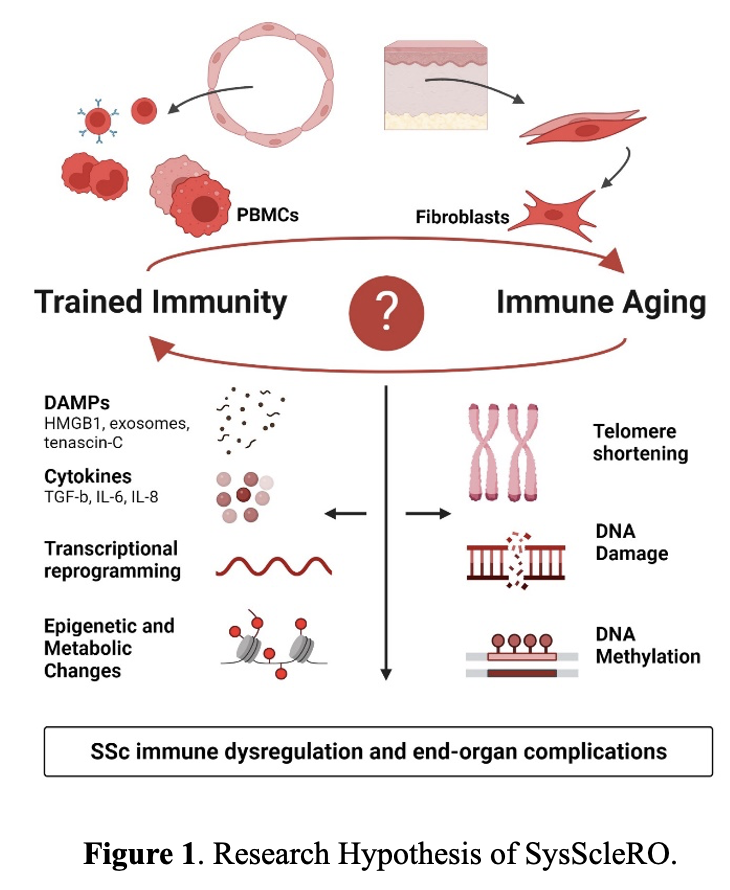SysScleRO – Systems immunology for systemic sclerosis (SSc): assessment of innate immune memory and immune aging as basis for individualised prevention and treatment modalities in SSc
- Detalii
- Accesări: 57

Contract no: 760236/28.12.2023
Code: 82/31.07.2023
Project title: SysScleRO – Systems immunology for systemic sclerosis (SSc): assessment of innate immune memory and immune aging as basis for individualised prevention and treatment modalities in SSc
Total budget: 6,525,358 RON, of which the amount of PNNR financing is 6,000,000 RON and the related VAT is 525,358 RON.
Duration of project: 30 months (between 01.01.2024-30.06.2026)
Project Director: Prof.Dr. Yang Li, Professor in computational biology, Centre for Individualised Infection Medicine (CiiM) and Helmholtz Centre for Infection Research, Hannover Medical School, Germany.
The implementation place: Department of Medical Genetics at University of Medicine and Pharmacy “Iuliu Hațieganu” Cluj-Napoca.
Summary
Systemic sclerosis (SSc) is a progressive debilitating and life-altering connective tissue disease with a pathogenesis that involves a complex interplay between microangiopathy, immune dysfunction and fibrosis, leading to various and heterogenous disease manifestations that warrant a personalized therapeutic approach. However, current treatment guidelines primarly focus on symptomatic treatment based on disease subsets and type of internal organ involvement, rather than addressing the predominant underlying pathogenic mechanisms of action. Several reports suggest that innate immunity modulates SSc pathophysiology from an early stage of the disease, leading to fibroblast activation and subsequent fibrosis. Long-term innate immune memory (Trained immunity - TI) was also suggested to play a role in SSc. Moreover, immune aging(IA) research has identified shared features between immunological aging and cellular phenotype in SSc, including a single-cell RNA-sequencing based senescence signature in skin fibroblasts of SSc patients. Based on these recent literature findings and our pilot data, in SysScleRO we will investigate the role of TI and IA in SSc using systems biology. Our work will aim to identify inflammatory and immunological aging biomarkers in SSc, and will analyse their potential to stratify patients into different susceptibility categories or patient clusters that may benefit from tailored therapy. The current proposal focuses on personalized medicine for people with SSc and on finding new drug targets to provide cheaper and less invasive therapy options for SSc patients.
The project proposes that innate immunological reprogramming (trained immunity) takes place in the circulating cells/fibroblasts of SSc patients. This process may contribute to immune aging through the release of inflammatory factors and could alter tissue and organ homeostasis.

The overall aim of this project is to implement a systems biology approach to describe immune responses and immunological memory in patients with SSc and to assess whether this contributes to an accelerated aging phenotype in blood cells and fibroblasts leading to to proinflammatory and pro-fibrotic processes.
Specific Objectives:
OS1. Explore trained immunity (IT)-like processes with a possible role in the dysregulated inflammation observed in SSc (maladaptive persistent proinflammatory responses, metabolic and transcriptional rewiring, epigenetic changes, all influenceble by genetics).
OS2. Is immunological aging (IA) a feature of circulating cells or fibroblasts in SSc? (functional and genetic assays)
OS3. Investigate the factors that control the interaction between TI and AI in SSc and how they can be used for patient stratification and the development of new therapies (multi-omic data integration).
„PNRR. Finanțat de Uniunea Europeană – UrmătoareaGenerațieUE”
“Conținutul acestui material nu reprezintă în mod obligatoriu poziția oficială a Uniunii Europene sau a Guvernului României“
https://mfe.gov.ro/pnrr/ ; https://www.facebook.com/PNRROficial



